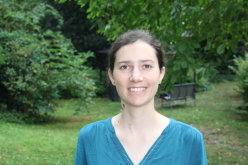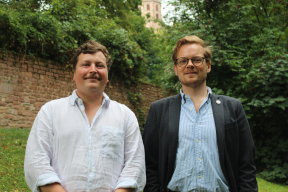Hengstberger Award 2023
Dr. Melanie Chevance
Dr. des. Nicolai Futás, Dr. Jonas Osnabrügge
Dr. Anja Randecker
2024, 2023, 2022, 2021, 2020, 2019, 2018, 2017, 2016, 2015, 2014, 2013, 2012, 2011, 2010, 2009, 2008, 2007, 2006, 2005, 2004
The Feedback-Driven Matter Cycle in Galaxies: new perspectives from JWST
Conference date: June 3 – 7, 2024
Stars form out of dense gas clouds within galaxies. Throughout their lives and when they die, these stars inject energy, momentum and new chemical elements back into their surroundings, generating a feedback loop. This multi-scale cycling of matter between gas clouds and stars represents the main driver of galaxy evolution. However, its complexity also makes it one of the main unknowns in modern astrophysics, and the main uncertainty in simulations of galaxy formation and evolution. The unprecedented observing capabilities of the new James Webb Space Telescope (JWST) shed a new light on this matter cycle in galaxies, by allowing us to study the effects of stellar feedback in more detail than ever before, from the heating of the gas and dust by the youngest stars, to the dispersal of the parent gas cloud by the radiation and winds of massive stars, and ultimately to the giant gas shells blown out by supernova explosions. The first observations demonstrate that we are now able to observe these signatures of feedback in a wide range of environments, from nearby star-forming regions to distant galaxies. The first JWST observations are already in hand, its capabilities are now well understood, and 5 years are left to acquire new observations with this revolutionary telescope. This Hengstberger Symposium will bring together world-leading experts from several fields in astrophysics, with expertise in simulations, observations and theory, to discuss the recent advances in our understanding of feedback and identify the directions in which progress with JWST should be prioritised.

Institut für Theoretische Astrophysik
Albert-Ueberle-Str. 2
E-mail: chevance(at)uni-heidelberg.de
Experiencing the Oecumene: Aspects of Touristic Travelling in the Ancient Mediterranean
Conference date: October 7 – 9, 2024
The Hengstberger symposium 'Experiencing the Oecumene' is dedicated to an aspect of human mobility in antiquity that has been insufficiently researched so far: touristic travel. That tourism is also an ancient phenomenon is not a new insight. However, until now, classical scholars have only dealt with it in rudimentary form, and the study of the numerous existing sources has mostly remained isolated. This symposium will bring together both established experts and young scholars from various disciplines of classical studies – ancient history, epigraphy, archaeology – to examine this topic in three thematically structured sessions from different perspectives, integrating the latest research results. In the first session, fundamental conceptual and methodological questions will be discussed, in particular how the phenomenon of tourist travel can be understood both conceptually and analytically. Against this background, there will be enough time to present and discuss the rich sources on ancient tourist travel together during the following days. The second session will focus on epigraphic and literary sources, while the third session will deal with the local impact of tourism on the level of architecture and infrastructure. The final aim of the symposium is to bring the phenomenon of ancient touristic travel more into the focus of research and to create a common basis for future studies on this important and timeless aspect of human mobility.

Dr. des. Nicolai Futás
Seminar für Alte Geschichte und Epigraphik
Marstallhof 4
69117 Heidelberg
E-mail: nicolai.futas(at)zaw.uni-heidelberg.de
Dr. Jonas Osnabrügge
Seminar für Alte Geschichte und Epigraphik
Marstallhof 4
69117 Heidelberg
E-mail: jonas.osnabruegge(at)zaw.uni-heidelberg.de
Geometry and dynamics of surfaces beyond finite-type
Conference date: July 8-12, 2024
Surfaces are mathematical objects that we also encounter in everyday life. The first examples of surfaces that come to mind are of "finite type": they have finitely many "handles" (like a coffee cup has one) and finitely many "holes" (like the valve of a floatie). In mathematical and physical theories, however, surfaces can also be "of infinite type". Here the number of handles becomes infinite, or the number of holes, or both. These surfaces are less well studied, but play an important role in several areas of math (such as geometry and dynamics), as well as physics.
One way to study these surfaces is through the their symmetries. While there is a classification in the classical case, there still is no classification of symmetries known for surfaces of infinite type. We will approach this question by considering measured laminations and geodesic currents, objects that are akin to curves on surfaces, but they complete the space of curves in the same sense as the real numbers complete the rational numbers.
The goal of this workshop is to bring together a group of young researchers to learn from each other about surfaces of infinite type and geodesic currents and to start projects to push the frontiers of the field.

Dr. Anja Randecker
Institute for Mathematics
Im Neuenheimer Feld 205
69120 Heidelberg
E-mail: randecker(at)mathi.uni-heidelberg.de

